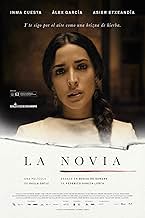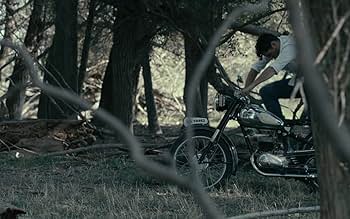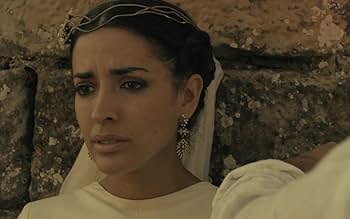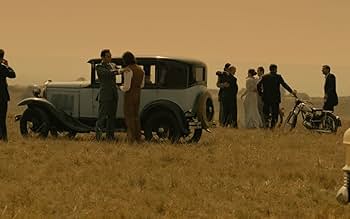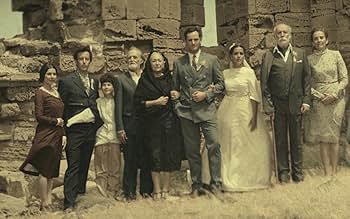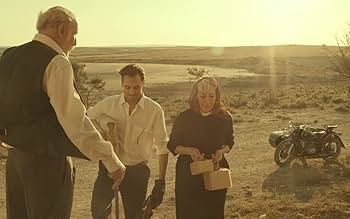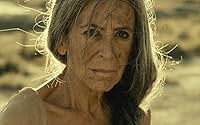IMDb-BEWERTUNG
6,6/10
3637
IHRE BEWERTUNG
Eine tragische Geschichte über unerfüllte Leidenschaft und verbotene Sehnsucht, widersprüchliche Entscheidungen, Betrug und das unvermeidliche Schicksal dreier Liebender, die der wahren Natu... Alles lesenEine tragische Geschichte über unerfüllte Leidenschaft und verbotene Sehnsucht, widersprüchliche Entscheidungen, Betrug und das unvermeidliche Schicksal dreier Liebender, die der wahren Natur des Menschen machtlos gegenüberstehen.Eine tragische Geschichte über unerfüllte Leidenschaft und verbotene Sehnsucht, widersprüchliche Entscheidungen, Betrug und das unvermeidliche Schicksal dreier Liebender, die der wahren Natur des Menschen machtlos gegenüberstehen.
- Regie
- Drehbuch
- Hauptbesetzung
- Auszeichnungen
- 19 Gewinne & 34 Nominierungen insgesamt
Carmela Labordeta
- Novia Joven
- (as Carmela del Campo)
Empfohlene Bewertungen
The film crew has shot a poem rather than a movie. You would either love or hate this piece; there is most probably no middle ground. I am personally in the former camp. The story itself is as familiar as an ancient Greek tragedy: namely, the sinfully intense love and the revengeful fate. The images are so captivating that makes you feel the characters exist out of space-time. This is highlighted when the heroin encounters "herself" more than a few times throughout the film. If you love poetry in images, then you will not easily forget the beautiful scenes and that primordial sadness arising from the unavoidable fate.
Greetings again from the darkness. The pitch for this movie might have come across as blending a Greek tragedy with a romance novel, and then adding a dash of revenge. Fortunately director Paula Ortiz's vision for the Federico Garcia Lorca play "Bodas de sangre" is more poetic and lyrical than such an overview would suggest.
Love triangles are the core of many stories and movies, but it's the opening sequence here that clues us in that the trouble has already occurred, and though it removes some of the suspense of "what", it certainly sets the stage for an interesting "how" and "why".
Beautiful Inma Cuesta plays Novia (billed only as the titular bride) who is engaged to Asier Etxeandia (billed only as Novio, the groom). The abundance of family stress (on both sides) has little to do with the wedding plans, and more to do with Leonardo (Alex Garcia). Leonardo is more than the local hunk who is always lurking about on horseback; he's also the third wheel who can't let go of his desire for Novia in spite of his young child and pregnant wife. To make things messier, Novia seems to answer his heightened desire for her with her own uncontrollable passion for him.
It's Yin and Yang. Safe and Dangerous. The bride's conflicted choice leads the groom's mother (Goya winner Luisa Gavasa) to be a foreboding presence throughout, and keeps most of the village on edge. Additionally, there is an element of mysticism as Maria Alfonsa Rossa appears periodically as the figure of death – and we are never quite sure of the motivations behind her advice.
Goya winner Miguel Amoedo provides beautiful cinematography that balances between fantasy, harsh realities, and the romance of the moment. There are many intimate close-ups, as well as some stunning desert wide shots of Leonardo riding the horse. The score and soundtrack are terrific, including Soledad Velez with a haunting version of Leonard Cohen's "Take this Waltz".
The concept of destiny vs. choice hovers over most scenes, and the twisted family and childhood histories give the film a Shakespearian feel. Last year, the film received numerous Goya nominations (including Ms. Cuesta, Ms. Ortiz, Mr. Garcia) are resulted in the wins for Ms. Gavasa and Mr. Amoedo. It may not make the best Valentine's Day date movie, but it is an interesting watch from the romance-tragedy-revenge-horseback genre.
Love triangles are the core of many stories and movies, but it's the opening sequence here that clues us in that the trouble has already occurred, and though it removes some of the suspense of "what", it certainly sets the stage for an interesting "how" and "why".
Beautiful Inma Cuesta plays Novia (billed only as the titular bride) who is engaged to Asier Etxeandia (billed only as Novio, the groom). The abundance of family stress (on both sides) has little to do with the wedding plans, and more to do with Leonardo (Alex Garcia). Leonardo is more than the local hunk who is always lurking about on horseback; he's also the third wheel who can't let go of his desire for Novia in spite of his young child and pregnant wife. To make things messier, Novia seems to answer his heightened desire for her with her own uncontrollable passion for him.
It's Yin and Yang. Safe and Dangerous. The bride's conflicted choice leads the groom's mother (Goya winner Luisa Gavasa) to be a foreboding presence throughout, and keeps most of the village on edge. Additionally, there is an element of mysticism as Maria Alfonsa Rossa appears periodically as the figure of death – and we are never quite sure of the motivations behind her advice.
Goya winner Miguel Amoedo provides beautiful cinematography that balances between fantasy, harsh realities, and the romance of the moment. There are many intimate close-ups, as well as some stunning desert wide shots of Leonardo riding the horse. The score and soundtrack are terrific, including Soledad Velez with a haunting version of Leonard Cohen's "Take this Waltz".
The concept of destiny vs. choice hovers over most scenes, and the twisted family and childhood histories give the film a Shakespearian feel. Last year, the film received numerous Goya nominations (including Ms. Cuesta, Ms. Ortiz, Mr. Garcia) are resulted in the wins for Ms. Gavasa and Mr. Amoedo. It may not make the best Valentine's Day date movie, but it is an interesting watch from the romance-tragedy-revenge-horseback genre.
"At the heart of all great art is an essential melancholy", Spanish dramatist Federico Garcia Lorca's own words which also aptly describe La Novia, a new filmic adaptation by Paula Ortiz of his 1932 play, Bodas de Sangre (Blood Wedding), a tragedy which details a bride's indecision when she is torn between her newly-wedded husband, and her lover. I went to see this film at a Spanish cinema in Cadiz this week with friends, and I was not at all disappointed. Although I have never studied this particular play, I am quite familiar with Lorca's other work, having analysed his Romancero Gitano (Gypsy Poetry) at University and his equally influential play, La Casa de Bernarda Alba (The House of Bernarda Alba), at Grammar School. Throughout his work, Lorca's sympathy is always with the lower classes, from which come his protagonists. Lorca's own story is an interesting and melancholic one, coming from a wealthy farming background in Andalucia, and growing to dislike his status of wealth, and identifying instead with the lowly.
Not only was Lorca troubled by his own social identity, he was also homosexual, which, you will see, adds another dimension to his written work and which, along with his status as a political dissident in the Spanish Civil War, led to his brutal assassination at the hands of the Civil Guard. I digress... La Novia is a beautiful film which makes wonderful use of long shots to capture the warm, bare, aridity of Spanish countryside, almost a metaphor for death and devastation which the transgression brings in the story. It was, I imagine, almost a given that this film would win this year's Goya Award for Cinematography, with thanks to Miguel Amoedo. For the average film-goer, the plentiful, expressive shots may lag, and may be seen as "art for art's sake". All the same, one cannot deny the awe they inspire. In terms of the acting, Inma Cuesta is wonderful in the part of the bride, and often looks strikingly like a young Penelope Cruz. Equally great are the bride's love interests; Asier Etxeandia, who plays the husband; and Alex Garcia, who plays Leonardo, the lover. Spanish film aficionados will also be able to recall Luisa Gavasa, a stalwart of Spanish cinema, who stuns with her performance as the husband's mother - a character beset with horrific premonitions of a disastrous marriage. The music, by Shigeru Umebayashi, is also stirring.
Lorca also said in his lifetime that "In Spain, the dead are more alive than the dead of any other country in the world." This new (filmic) lease of "life" for Lorca is clear proof of this statement. As I have already seen, Spain is a country which refuses to forget its past, literary, filmic, or otherwise.
Not only was Lorca troubled by his own social identity, he was also homosexual, which, you will see, adds another dimension to his written work and which, along with his status as a political dissident in the Spanish Civil War, led to his brutal assassination at the hands of the Civil Guard. I digress... La Novia is a beautiful film which makes wonderful use of long shots to capture the warm, bare, aridity of Spanish countryside, almost a metaphor for death and devastation which the transgression brings in the story. It was, I imagine, almost a given that this film would win this year's Goya Award for Cinematography, with thanks to Miguel Amoedo. For the average film-goer, the plentiful, expressive shots may lag, and may be seen as "art for art's sake". All the same, one cannot deny the awe they inspire. In terms of the acting, Inma Cuesta is wonderful in the part of the bride, and often looks strikingly like a young Penelope Cruz. Equally great are the bride's love interests; Asier Etxeandia, who plays the husband; and Alex Garcia, who plays Leonardo, the lover. Spanish film aficionados will also be able to recall Luisa Gavasa, a stalwart of Spanish cinema, who stuns with her performance as the husband's mother - a character beset with horrific premonitions of a disastrous marriage. The music, by Shigeru Umebayashi, is also stirring.
Lorca also said in his lifetime that "In Spain, the dead are more alive than the dead of any other country in the world." This new (filmic) lease of "life" for Lorca is clear proof of this statement. As I have already seen, Spain is a country which refuses to forget its past, literary, filmic, or otherwise.
Beautiful and fantastic (as in fantasy!) photography and scenery: the greatest contribution made by cinematography in the direction of Paula Ortiz to the already thriving "Bodas de Sangre" play by Federico Garcia Lorca.
A play full of strong and deep poetry in which the destiny of the characters are controlled and dictated by their deepest emotions as if these emotions were fierce Gods that are far beyond any human control or law, and just as the ancient Gods of most mythologies played with the destiny of the mortals as if leafs in the winds, the emotions portrayed in this film do the same to the lives of every single character in this film: merciless, relentlessly.
Talking specifically about the film, one of the new 'extensions' added in the film and absent in the play, is the great metaphor of the crystals all across the film. Lorca use the word 'cristal' and 'vidrio' plenty of times in the play without referring to an actual crystal but as literary resource, and the development of this idea in images is magical and beautiful.
A downside of the film, for those who cannot understand Spanish, is the very lame translation in the English captions. I do speak Spanish as my native tongue but I had to turn the captions on at some moments because they whisper a lot and some pronunciations are difficult to grasp. As I said, this film is full of delightful poetry, not only visually but literally and is a shame that the translator didn't seem to notice that, as a result some of the most brilliant moments of the movie become plain and bland if reading the English translation. There is even one moment in which the translation express exactly the opposite to the original meaning.
Not taking in great consideration this last thing, La Novia is an amazing film that I would recommend to everyone except to those that faint when they see blood.
A play full of strong and deep poetry in which the destiny of the characters are controlled and dictated by their deepest emotions as if these emotions were fierce Gods that are far beyond any human control or law, and just as the ancient Gods of most mythologies played with the destiny of the mortals as if leafs in the winds, the emotions portrayed in this film do the same to the lives of every single character in this film: merciless, relentlessly.
Talking specifically about the film, one of the new 'extensions' added in the film and absent in the play, is the great metaphor of the crystals all across the film. Lorca use the word 'cristal' and 'vidrio' plenty of times in the play without referring to an actual crystal but as literary resource, and the development of this idea in images is magical and beautiful.
A downside of the film, for those who cannot understand Spanish, is the very lame translation in the English captions. I do speak Spanish as my native tongue but I had to turn the captions on at some moments because they whisper a lot and some pronunciations are difficult to grasp. As I said, this film is full of delightful poetry, not only visually but literally and is a shame that the translator didn't seem to notice that, as a result some of the most brilliant moments of the movie become plain and bland if reading the English translation. There is even one moment in which the translation express exactly the opposite to the original meaning.
Not taking in great consideration this last thing, La Novia is an amazing film that I would recommend to everyone except to those that faint when they see blood.
Visually stunning and emotionally charged Spanish drama that delves into the complexities of love and passion.
First and foremost, Inma Cuesta's performance as the eponymous "Novia" (Bride) is captivating. She portrays the character's emotional turmoil and inner conflict with remarkable depth and vulnerability.
The film's cinematography is a standout feature, capturing the rugged and breathtaking landscapes of rural Spain. The visual storytelling adds an extra layer of beauty to the narrative.
La Novia explores themes of forbidden love, loyalty, and the consequences of past decisions. It weaves a tale of passion and tragedy, leaving a lasting impact on the viewer.
The emotional intensity of the film is heightened by a haunting musical score that perfectly complements the story's dramatic beats.
The supporting cast, including Álex García and Asier Etxeandia, deliver solid performances, adding depth to the complex web of relationships.
However, some viewers may find the film's pacing slow, as it takes its time to delve into the intricacies of the characters' emotions and relationships.
In conclusion, La Novia is a visually striking and emotionally charged drama that immerses viewers in a world of passion and heartache. With Inma Cuesta's compelling performance, the stunning cinematography, and the film's exploration of forbidden love, it's a cinematic experience that leaves a lasting impression.
If you appreciate atmospheric and emotionally-driven films with a touch of romance, La Novia is a must-watch. It's a poignant and visually captivating journey into the complexities of human relationships and the power of love.
First and foremost, Inma Cuesta's performance as the eponymous "Novia" (Bride) is captivating. She portrays the character's emotional turmoil and inner conflict with remarkable depth and vulnerability.
The film's cinematography is a standout feature, capturing the rugged and breathtaking landscapes of rural Spain. The visual storytelling adds an extra layer of beauty to the narrative.
La Novia explores themes of forbidden love, loyalty, and the consequences of past decisions. It weaves a tale of passion and tragedy, leaving a lasting impact on the viewer.
The emotional intensity of the film is heightened by a haunting musical score that perfectly complements the story's dramatic beats.
The supporting cast, including Álex García and Asier Etxeandia, deliver solid performances, adding depth to the complex web of relationships.
However, some viewers may find the film's pacing slow, as it takes its time to delve into the intricacies of the characters' emotions and relationships.
In conclusion, La Novia is a visually striking and emotionally charged drama that immerses viewers in a world of passion and heartache. With Inma Cuesta's compelling performance, the stunning cinematography, and the film's exploration of forbidden love, it's a cinematic experience that leaves a lasting impression.
If you appreciate atmospheric and emotionally-driven films with a touch of romance, La Novia is a must-watch. It's a poignant and visually captivating journey into the complexities of human relationships and the power of love.
Wusstest du schon
- WissenswertesDirector Paula Ortiz cares immensely about the artistry of the shots and takes, that's why the cast usually had to act through adverse or unpleasant environment conditions. For example, the scene when the bride sings "la Tarara" was filmed in the middle of the desert of Los Monegros at 5 a.m. Actors also had to deal with strong wind (cierzo), blinding light or mosquitoes, or even against the clock filming when the scenes happened at sunset.
- PatzerThe groom chases the unfaithful bride on a BMW R25/2, formerly seen in the film with a sidecar. When he arrives, he rides an unidentified motorcycle (could it be a BSA?) which stalls.
Top-Auswahl
Melde dich zum Bewerten an und greife auf die Watchlist für personalisierte Empfehlungen zu.
- How long is The Bride?Powered by Alexa
Details
- Erscheinungsdatum
- Herkunftsländer
- Offizieller Standort
- Sprache
- Auch bekannt als
- The Bride
- Drehorte
- Produktionsfirmen
- Weitere beteiligte Unternehmen bei IMDbPro anzeigen
Box Office
- Budget
- 1.187.147 € (geschätzt)
- Weltweiter Bruttoertrag
- 1.779.966 $
- Laufzeit1 Stunde 36 Minuten
- Farbe
Zu dieser Seite beitragen
Bearbeitung vorschlagen oder fehlenden Inhalt hinzufügen


![Tráiler [OV] ansehen](https://m.media-amazon.com/images/M/MV5BMzg3YWM0YjAtNDg2ZC00ZGE0LWJhYzMtNzg3NjBmYTcxY2FhXkEyXkFqcGdeQXRyYW5zY29kZS13b3JrZmxvdw@@._V1_QL75_UX500_CR0)
![Teaser Tráiler [OV]](https://m.media-amazon.com/images/M/MV5BNTVjMzNlNGEtMDNhNi00MGY1LTgxNzUtZDc3YjA2NGUyODE0XkEyXkFqcGdeQXRyYW5zY29kZS13b3JrZmxvdw@@._V1_QL75_UX500_CR0)
